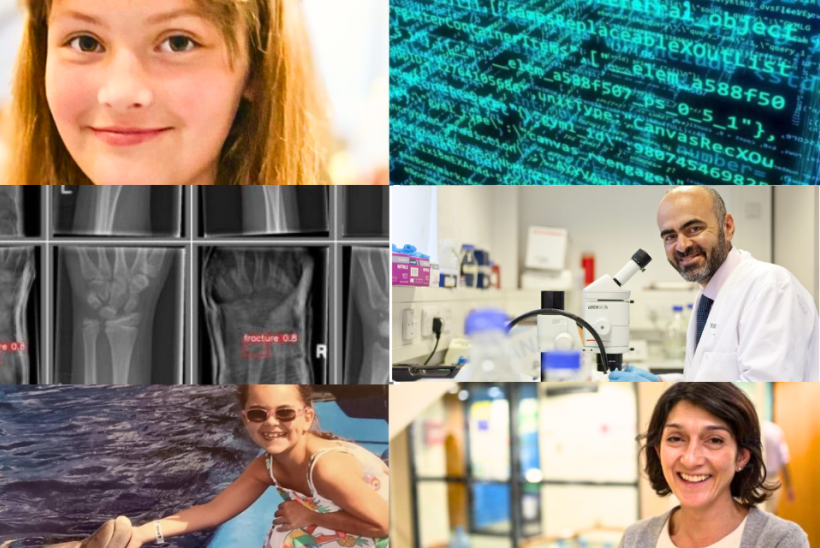10 Moments of Research and Innovation at GOSH in 2024
It’s been a busy year for Research and Innovation at GOSH, with a number of ground breaking research trials, advanced data projects and technology pilots.
To round off the year, here are just twelve of the stories (and amazing staff and researchers) that we shared this year.
We’re looking forward to seeing what 2025 will bring!
1. GOSH announces collaboration in pioneering PHEMS project to revolutionise use of health data across Europe
GOSH announces it is one of six leading European children’s hospitals to make up the PHEMS project consortium. PHEMS (short for ‘Paediatric Hospitals as European drives for multi-party computation and synthetic data generation capabilities across clinical specialities and data types’) project will revolutionise how children’s health data is managed and used across Europe and advance research and innovation in healthcare for children, while ensuring patient’s rights and data privacy remain protected.
2. Stem cells collected in late pregnancy herald advances in prenatal medicine
A new pioneering approach, developed by researchers at UCL and Great Ormond Street Hospital, means human development can be observed in late pregnancy for the first time, raising the possibility of monitoring and treating congenital conditions before birth.
3. New plan announced to get more children access to gene therapy treatments
GOSH, supported by LifeArc and Great Ormond Street Hospital Children’s Charity announces plans to revolutionise how children living with a rare disease can gain access to life-changing treatments that have been proven to work.
A big challenge with developing treatments for rare diseases is that due to small patient numbers they are often not commercially viable for companies to invest in and keep on the market, even if the treatment has been proven to cure a condition.
GOSH, LifeArc and GOSH Charity hope to address this through the plan which would be the first of its kind in the UK and the first time an NHS Trust would hold the market authorisation - or licence – for a gene therapy drug, meaning patients can directly access and benefit from the treatment.
4. New treatment for brain tumour approved after over 20 years of research
The first-ever targeted treatment for brain tumours in children was approved for NHS patients, following decades of research by GOSH consultant Professor Darren Hargrave.
5. First UK trial of Deep Brain Stimulation for children with epilepsy begins at GOSH
Thirteen-year-old Oran made history as the first patient in the UK to participate in a clinical trial using deep brain stimulation (DBS) to treat epilepsy.
Since the procedure, his daytime seizures have decreased by 80%, having a significant impact on his quality of life.
https://www.gosh.ae/news-articles/first-uk-trial-deep-brain-stimulation-children-epilepsy-begins
6. GOSH only hospital outside of North America to receive innovation funding award for Artificial Intelligence
GOSH was awarded the Amazon Web Services IMAGINE Grant: Children’s Health Innovation Award, to support AI development and drive progress for children’s healthcare.
GOSH was the only hospital outside of North America to be successful in receiving this funding.
7. New clinical trial at GOSH gives hope to children with aggressive blood cancer
Researchers at GOSH and UCL Great Ormond Street Institute of Child Health (UCL GOS ICH) are collaborating on a novel approach to clinical trials to give hope to children with an aggressive type of blood cancer, T-cell acute lymphoblastic leukaemia (T-ALL).
8. GOSH pilots AI tool to give clinicians more quality-time with patients
Patients and clinicians at GOSH took part in the first NHS trial of a bespoke healthcare AI tool, TORTUS, to help increase face-to-face time during appointments.
Following successful early stages at GOSH, the programme led by GOSH’s Data Research, Innovation and Virtual Environments (DRIVE) unit, has secured funding to deliver the first evaluation of ambient voice technology at scale in the NHS, in partnership with AI company TORTUS.
9. After a successful pilot, the GOSH Clinical Insights Unit is renewed to deliver advanced analytics for a second year
The Clinical Insights Unit (CIU) at GOSH DRIVE uses advanced data analytics to support operational decision making at GOSH.
The team is made up of data scientists and analysts who work with operational and clinical teams in the hospital to increase the accessibility and utility of Electronic Patient Record (EPR) data.
By partnering with the clinical and operational teams, the CIU can understand their needs and build digital tools to enable data-driven decision making to help run the hospital.
Clinical Insights Unit | GOSH DRIVE
10. Duchenne Muscular Dystrophy gene therapy trial highlights complexity of disease
The first large-scale trial of gene therapy for the debilitating neuromuscular disease, Duchenne Muscular Dystrophy (DMD) has been carried out by an international group of researchers, including Great Ormond Street Hospital (GOSH) and University College London (UCL).
DMD is a genetic condition which causes progressive muscle weakness, most commonly in boys.


